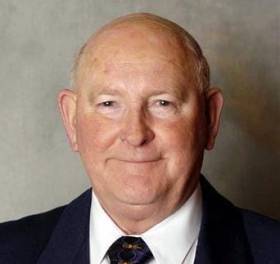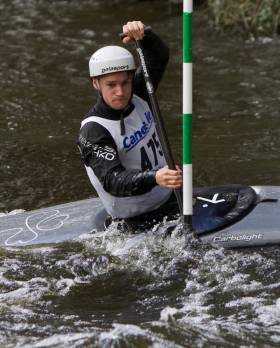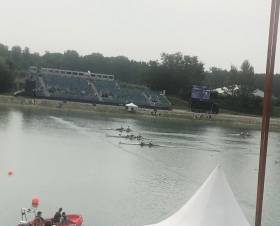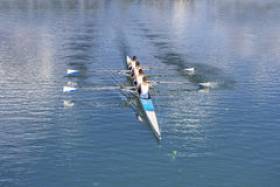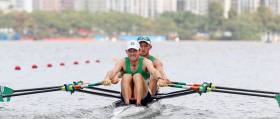Displaying items by tag: Olympic games
Rowing & Olympic Stalwart Peadar Casey Departs
Peadar Casey, who has died aged 86, was involved with rowing virtually all his adult life, often in very senior roles. He also played a big part in Olympic sport in Ireland.
He was a member of the Garda Síochána from 1953 to 1989 and he became honorary treasurer of Garda Síochána Boat Club in the late 1950s. The honorary treasurer role was one he would take on for a succession of bodies for most of the rest of his long life. He served in that capacity for Dublin Metropolitan Regatta, the Dublin Municipal Rowing Centre and then the Irish Amateur Rowing Union (which would become Rowing Ireland).
He was elected to the Olympic Council of Ireland and became honorary treasurer in 1996, a position he retained until retirement in 2014.
Peadar Casey was team manager for rowing at the 1980 Olympics Games in Moscow and the 1984 Montreal Olympics. He was chosen as deputy Chef de Mission to the Irish Olympic team in Atlanta 1996 and then Chef de Mission for the Olympic Games in Sydney in 2000.
His lifetime of dedication to sports administration had all kicked off when he took up rowing in the formative years of Garda Síochána Boat club when he had become champion of Ireland on multiple occasions.
He will be much missed by his family, friends and all those who knew him in the world of rowing and the Olympic Games.
#Rowing: Ireland will send a big team to the World Coastal Rowing Championships in Hong Kong early next month (November 1st to 3rd). Coastal Rowing is growing and may become part of the Olympic programme.
Niall O’Toole (49) was Ireland’s first world rowing champion. The three-time Olympian now runs Crew Class for indoor rowers. He tried his luck at the Irish Offshore Rowing Championships in September in Co Antrim. Here are his impressions.
The Rock’n Roll of Offshore Rowing
By Niall O’Toole
I was excited for my first offshore race. Rounding the corner, I arrived at the location to big breaking waves crashing onto the shoreline. I immediately knew this was something different: it was going to be ugly and unpredictable.
I fully hoped that the regatta would be called off, due to the extreme weather conditions. I looked to other competitors for solace. Instead of being able to gauge their fear, I was met with wide grins and a crazy glint in their eyes: they were unfazed. This was their normal. They were just looking forward to getting amongst it.
I’m used to something different. A sterile environment in your own lane, as fast as you can row from A to B over 2km. You train for your own race, your pace and pushes planned down to a T. You have very little to think about on the day, other than executing that race plan. A starter holds your stern, everyone in line, traffic lights signal the off. It’s all inch-perfect and highly controlled. You may have one or two glances out of the boat, but essentially you row without interference from others.
In Olympic-style rowing, we are guarded from the elements. Most international courses are strategically located to have a prevailing wind in one direction to avoid rough water. If there is wind, the water tends not to be affected. I wasn’t used to nature writing the rules.
There was a delay to racing due to a late change of course. We were told that it was no longer safe for the safety boats, and that rowers were likely to be pushed onto the rocks. When the officials said, “You need to ask yourself, is it safe for you to row today?” the answer was screaming in my head. The organisers said they’d run the first race and would review whether they would continue the regatta after that. I took this to mean that the first race competitors were now officially the canaries down the mine. They got around, despite buoys moving during the race, and the regatta continued, to my growing fear and dismay.
Shouldered with the weight of some rowing heritage behind me, I had to harness my dwindling toughness and get out onto the water, launching amidst breaking waves on the beach. Within 30 seconds I was completely soaked and instantly thought we needed a bigger boat.
The race starts with a floating start and is the only real part that you can plan. There are no individual lanes, just a fight for the best line around a 4km course of buoys. Your only real hope is to fly out the start and get clear of the field down to that all important first buoy, before traffic starts hitting you and rowing becomes a contact sport.
Battling the elements, and trying to keep the boat straight without a tiller was absolutely exhausting. Given my experience, I went out high and hard, but found it difficult to factor in the added dimensions of staying away from other boats and staying on the right lines to hit the markers. Trying to keep the boat straight against a crushing side-wind completely seized up my forearm within minutes of the start. Within the washing machine of the wind and waves, and the physical exertion of breathing through your ears, you are punished for small navigational mistakes which are big errors, handing away hard-fought lengths to more savvy and seasoned competitors.
I did enjoy it though, despite myself. The rush of adrenaline you get flying around buoys, fighting for your line, with other boats breathing down your neck. You are completely focused on getting in and out of the turn as quickly as possible, whilst also paranoid that your competitor is taking a better line, for reasons as yet unknown to you. The sheer volume of data you have to integrate along with the physical exertion maxed me out in a way I couldn’t have imagined.
This is one hell of a sport. Chaotic, unpredictable and exhilarating. It really is the rock’n roll of rowing. I’m completely hooked.
Niall O’Toole was part of the winning men’s quadruple, a composite crew of Wicklow, Kilurin and Ring, at the Irish Offshore Championships.
Hendrick Qualifies Ireland for Olympic Games in Canoeing
#Canoeing: Robert Hendrick qualified Ireland for an Olympic place in canoeing at the World Championships in La Seu d’Urgell in Spain this morning. Going off first in the C1 competition, the Kildare man put down a nerveless run of 95.12 seconds without a time penalty. It stood up as a fine time even as 29 more paddlers came down the course. The top 11 nations qualified for the Olympic Games and Hendrick gave Ireland 9th overall in this ranking. His personal placing of 11th saw him miss out by one place on an A Final place.
Canoe Slalom World Championships, La Seu d’Urgell, Spain (Irish interest)
Men
C1 – Semi-Final (First 11 nations qualify boat for Olympic Games; First 10 to A Final): 11 (ninth nation) R Hendrick 95.12 seconds.
Olympic Place Evades Ireland Women's Four at World Championships
#Rowing: Ireland's ambitions of booking a slot for a fifth boat at Tokyo 2020 came up short. The Ireland four of Tara Hanlon, Eimear Lambe, Aifric Keogh and Emily Hegarty had the difficult task of taking a top-two place in their B Final. They found their pace coming up to the line, but Britain, in lane five, and Canada in lane six took the crucial spots, with Ireland finishing fourth behind third-placed China.
The crosswind was a problem during the race and immediately afterwards the authorities redrew the lanes to acknowledge that lanes five and six were favoured.
World Rowing Championshiops, Linz-Ottensheim, Day Seven (Irish interest)
Women
Four - B Final (First Two book Olympic places for boat): 1 Britain 6:55.08, 2 Canada 6:56.99; 3 China 7:02.28, 4 Ireland Ireland (T Hanlon, E Lambe, A Keogh, E Hegarty) 7:02.71.
Pair - B Final (First Five book Olympic places for boat): 1 Romania 7:18.88, 2 Ireland (A Crowley, M Dukarska) 7:20.68.
Lightweight Double Sculls - C Final (Places 13 to 18) 1 China 7:00.82; 5 Ireland (A Casey, D Walsh) 7:10.52.
Thrilling Semi-Final Win By O'Donovan and McCarthy Sends Ireland Boat to Olympic Games
#Rowing: Ireland's first boat qualified for the 2020 Olympic Games is the lightweight men's double. Fintan McCarthy and Paul O'Donovan won in a thrilling semi-final here in Linz-Ottensmeim to take an A Final place at the World Championships and land a berth for the boat in Tokyo.
This was classic Paul O'Donovan. He gelled with his new partner, McCarthy, to produce a perfectly-judged finish which pushed Germany into second - by 13 hundredths of a second. Norway, like Ireland, had watched Germany and Australia do the early work, then closed on them in the final stages. The Norway crew of Are Strandli and Kris Brun, who were bronze medallists behind Ireland's silver in Rio 2016, produced the fastest finish of all to take third. Australia fell back to fifth.
All six A Finalists and the eventual winner of the B Final qualify boats for Tokyo 2020.
The Ireland women's pair of Aileen Crowley and Monika Dukarska will have to make their way through the B Final (placing fifth or better) if they are to qualify the boat for the Olympics. They finished fourth in a hotly-contested semi-final. New Zealand won with a commanding performance; the United States forced their way into second; the battle was joined between Ireland and fast-finishing Italy, who took the crucial third place.
World Rowing Championships, Linz-Ottensheim, Austria - Day Five (Irish interest)
Men
Lightweight Double Sculls - A/B Semi-Final Two (First Three to A Final; rest to B Final): 1 Ireland (F McCarthy, P O'Donovan) 6:13.46, 2 Germany 6:13.59, 3 Norway 6:14.15.
Women
Pair - A/B Semi-Final Two (First Three to A Final; rest to B Final): 1 New Zealand 6:57.92, 2 United States 7:01.78, 3 Italy 7:01.80; 4 Ireland (A Crowley, M Dukarska) 7:03.05.
Heavy Challenge for Ireland's Golden Rowers
#Rowing: Mark O’Donovan and Shane O’Driscoll, the world champions in the lightweight pair, have decided to go heavyweight. “We have to do this. We want to go to an Olympics and this is the best way of going," O’Driscoll told The Southern Star.
Only one lightweight boat, the lightweight double, is an Olympic discipline. Paul and Gary O’Donovan took silver at the Olympic Games in Rio de Janeiro in 2016. They recently showed good form at the Ireland trial.
Shane O’Driscoll and Mark O’Donovan have been bulking up and O’Driscoll said they were ready to take on this “new chapter” in their competitive lives. “Before we raced the World Championships we had decided to go heavyweight,” he said. “We had one regatta left before we made that decision and we really wanted to win that World Championship.”
Gary O'Donovan is Afloat Rower of the Month
#Rowing: The Afloat Rower of the Month for March is Gary O’Donovan. The Skibbereen man beat heavyweight oarsmen Sam McKeown and Daire Lynch in the single sculls final at the Ireland Trial. The conditions, with a cross headwind, were difficult for a lightweight. However, O’Donovan was sharpest in the closings stages and won. Paul, his younger brother and crewmate in the lightweight double which took silver at the Olympic Games, had exam pressures and had missed the trial. Named the Rower of the Month by Worldrowing.com, Paul O’Donovan was typically provocative when asked if he would ever team up with anyone other than his brother: “Gary is quite fast so I often row the double scull with him but if I could row with someone faster I would be happy.” Facing into the 2017 campaign, Gary proved that he is a key member of Ireland’s top crew.
Rower of the Month awards: The judging panel is made up of Liam Gorman, rowing correspondent of The Irish Times, and David O'Brien, editor of Afloat magazine. Monthly awards for achievements during the year will appear on afloat.ie. Keep a monthly eye on progress and watch our 2017 champions list grow.
Claire Lambe in Cambridge Crew for Boat Races
#Rowing: Claire Lambe has been named in the Cambridge crew for the Women’s Boat Race on April 2nd. The Dubliner (26) will row in the number three seat for the light blues. Lambe represented Ireland at the Olympic Games in 2016, partnering Sinead Lynch in the lightweight double which reached the A Final.
Cambridge, who were beaten by Oxford in the last two years, have a very strong crew with a marked international aspect. “It’s the best crew we’ve had,” said Rob Baker, the Cambridge coach. Baker is a former Ireland under-23 coach.
Removal of Lightweight Four From Olympics a Blow For Irish Rowing
#Rowing: The men’s lightweight four will be removed from the Olympic programme. Ninety-four votes at the Fisa Extraordinary Congress in Tokyo went to the proposal to replace the lightweight four with the women’s four in an attempt to create gender balance in rowing at the Games. A counter proposal to achieve gender balance by introducing a women’s lightweight four received 67 votes.
The lightweight four has been one of the most successful of Irish boats, with crews finishing fourth at the Atlanta Games in 1996 and sixth at the Athens Games in 2004.
Olympic Medallists Afloat Rowers of the Month
#Rowing: Paul and Gary O’Donovan are the Afloat Rowers of the Month for August. The brothers from West Cork achieved something no Irish crew had done before when they took a silver medal at the Olympic Games regatta in Rio de Janeiro in the lightweight double sculls. The O’Donovans had become European champions in Brandenburg in May. Paul ended the month of August by becoming world champion in the lightweight single sculls in Rotterdam - he was the only competitor who medalled at the Olympic Games and the World Championships.
At a tribute to the entire Ireland Olympic squad in UCD, the great Sean Drea, who finished fourth at the Olympic Games in Montreal in 1976, thanked the Ireland silver medallists. “On behalf of all the fourth-placed Olympians I would like to thank the O’Donovans for taking that monkey off our backs!” he said.
Rower of the Month awards: The judging panel is made up of Liam Gorman, rowing correspondent of The Irish Times, and David O'Brien, editor of Afloat magazine. Monthly awards for achievements during the year will appear on afloat.ie and the overall national award will be presented to the person or crew who, in the judges' opinion, achieved the most notable results in, or made the most significant contribution to rowing during 2016. Keep a monthly eye on progress and watch our 2016 champions list grow.


























